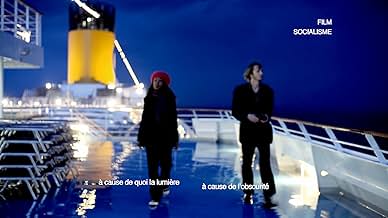CALIFICACIÓN DE IMDb
5.7/10
3 k
TU CALIFICACIÓN
Los pasajeros de un crucero mediterráneo disfrutan a la par que una familia sufre por la atención sobrecogedora por parte de los medios de comunicación.Los pasajeros de un crucero mediterráneo disfrutan a la par que una familia sufre por la atención sobrecogedora por parte de los medios de comunicación.Los pasajeros de un crucero mediterráneo disfrutan a la par que una familia sufre por la atención sobrecogedora por parte de los medios de comunicación.
- Dirección
- Guionistas
- Elenco
- Premios
- 5 premios ganados y 2 nominaciones en total
Agatha Couture
- Alissa (segment "Des choses comme ça")
- (as A. Couture)
Mathias Domahidy
- Mathias (segment "Des choses comme ça")
- (as M. Domahidy)
Quentin Grosset
- Ludovic (segment "Des choses comme ça")
- (as Q. Grosset)
Maurice Sarfati
- (segment "Des choses comme ça")
- (as M. Sarfati)
Nadège Beausson-Diagne
- Constance (segment "Des choses comme ça")
- (as N. Beausson)
Dominique Devals
- (segment "Des choses comme ça")
- (as D. Devals)
Marine Battaggia
- Florine "Flo" Martin (segment "Quo vadis Europa")
- (as M. Battaggia)
Opiniones destacadas
A Jean-Luc Godard double feature for me this evening. The first was Alphaville. This film, reported to be Godard's last, is a far cry from that.
It was shot entirely in digital, and the colors are breathtaking. It was meant to be seen in the theater, according to Godard, but I had to settle for video. There are numerous technical "glitches" in the film, and they were meant to be there.
Most of the film's text is in French with a smattering of German, Russian, Arabic, Hebrew, Latin, and Greek. Godard added subtitles in what he termed "Navajo English" at the bottom of the frame, which were as unhelpful as they were meant to be. The film is about a failure to communicate.
This is one of those films where the critics are far more enamored than the general populace. It is considered one of the top films of 2011 - almost the top ten. The people would disagree.
It was shot entirely in digital, and the colors are breathtaking. It was meant to be seen in the theater, according to Godard, but I had to settle for video. There are numerous technical "glitches" in the film, and they were meant to be there.
Most of the film's text is in French with a smattering of German, Russian, Arabic, Hebrew, Latin, and Greek. Godard added subtitles in what he termed "Navajo English" at the bottom of the frame, which were as unhelpful as they were meant to be. The film is about a failure to communicate.
This is one of those films where the critics are far more enamored than the general populace. It is considered one of the top films of 2011 - almost the top ten. The people would disagree.
Godard seemed to always be concerned with the pretension of language being inadequate to convey meaning, which is stated more clearly in the title of his 2014 film, Goodbye to Language. Not only does he suggest language is a poor mediator of meaning (in a fashion so incoherent that you have to figure this out from second hand accounts in many cases... or from longterm fanboyism), but he makes sure you won't get any meaning out of the film by making it inscrutable and fractured. There is little to cling to. Characters come and go, nameless ones, who fail to be more than ghostly stereotypes that function as many different mouthpieces for Godard.
There are political references, mentions of Stalin, Hitler, other dictators, communists, events related to WWII or occurring just before or after it, colonialism, etc... Some of the references are obscure, some quite well known, but they're all thrown around in an incoherent jumble. Never much more than a bunch of ideas that one can mostly only guess about.Most ideas remain too undeveloped to be interesting or garner much though from the viewer. It's mostly just name dropping and references. His films took a turn for an essayistic style—essentially essay films, barraging an audience with many ideas, skits, monologues, visuals, poems, sounds, music, etc. in a sometimes pleasing medley—he could convey so much, often doing so with considerable panache, but it seems to me that he's becoming less coherent and fails to be interesting in his experiments it's all so detached. Early iterations of his style had a semblance of narrative to run the ideas through or developed mouthpieces that could be more easily identified as a sign of something. He's gone too far into the excesses of postmodernism and has failed to craft an engaging piece of cinema. No, this is more like unfunny (okay so sometimes it is funny: "Go invade another country," says a rude girl when pressed for an answer by tourists—oh, and this is while she's reading Balzac, which is revealed with a camera zoom, followed by random shots of a llama and disconnected shards of dialogue) comedy vignettes than cinema. Godard actually comes off as a bit of a memelord here—the man always was with the times the hyperactive nature and strange soundbites lend it that kind of quality, not to mention the cat video that Alissa watches (accompanied by her obnoxious imitation "meow."
The chronology of the movie seems to be Part 1: Godard goes on a cruise with his rich friends. Part 2: Godard films in his backyard and focuses on a family. Part 3: Archival footage that mercifully does away with all the annoying characters
Many images do not work very well with the spoken word, and one might argue: that is the point. The actors don't really act—they're there to be mouthpieces, even more so than many older Godard movies. They're little more than a source being cited in a paper. Actor's often speak in a loopy French sing-song poetic style, which contradicts the rather prosaic lines often spoken, not to mention the chopped up mess that are the subtitles of this film—Navajo English, which is one of Godard's jokes for translating the french into English and cutting out words on a whim to make less sense than he usually makes.
Compared to his old work with Raoul Cotard, the cinematography is rather ugly at many points. He uses many different digital cameras—from webcams to professional cinema cameras. There are digital artifacts and he tends to heavily oversaturate the colors in certain scenes to the point where the images look warped. Some shots look lovely but there's no real rhyme or reason to it, no consistency. Random canted angles of random things happening on the cruise ship, for example—random montages, etc.
One example of a scene would be the year 1936 being referenced. Following that, a woman on screen has a monologue about Moscow's and other countries involvement in the Spanish Civil War. Matryoshka dolls are sitting around her in the foreground. She is arguing with a person, and the movement of gold out of the Spanish bank is a key topic. Some other woman, unseen in the background, begins to babble something unrelated, some of it while the first woman is still talking. A male character approaches the first woman, ruffles her hair, and name drops a communist, then walks away... that's what most of the movie is like, only less interesting.
Godard is just some elitist who expects everyone to learn his language, not like language is an effective means of expression, according to him, the absurdist. Luckily the DVD has full English subs, not that it makes a lot of sense most of the time, anyway.
There are political references, mentions of Stalin, Hitler, other dictators, communists, events related to WWII or occurring just before or after it, colonialism, etc... Some of the references are obscure, some quite well known, but they're all thrown around in an incoherent jumble. Never much more than a bunch of ideas that one can mostly only guess about.Most ideas remain too undeveloped to be interesting or garner much though from the viewer. It's mostly just name dropping and references. His films took a turn for an essayistic style—essentially essay films, barraging an audience with many ideas, skits, monologues, visuals, poems, sounds, music, etc. in a sometimes pleasing medley—he could convey so much, often doing so with considerable panache, but it seems to me that he's becoming less coherent and fails to be interesting in his experiments it's all so detached. Early iterations of his style had a semblance of narrative to run the ideas through or developed mouthpieces that could be more easily identified as a sign of something. He's gone too far into the excesses of postmodernism and has failed to craft an engaging piece of cinema. No, this is more like unfunny (okay so sometimes it is funny: "Go invade another country," says a rude girl when pressed for an answer by tourists—oh, and this is while she's reading Balzac, which is revealed with a camera zoom, followed by random shots of a llama and disconnected shards of dialogue) comedy vignettes than cinema. Godard actually comes off as a bit of a memelord here—the man always was with the times the hyperactive nature and strange soundbites lend it that kind of quality, not to mention the cat video that Alissa watches (accompanied by her obnoxious imitation "meow."
The chronology of the movie seems to be Part 1: Godard goes on a cruise with his rich friends. Part 2: Godard films in his backyard and focuses on a family. Part 3: Archival footage that mercifully does away with all the annoying characters
Many images do not work very well with the spoken word, and one might argue: that is the point. The actors don't really act—they're there to be mouthpieces, even more so than many older Godard movies. They're little more than a source being cited in a paper. Actor's often speak in a loopy French sing-song poetic style, which contradicts the rather prosaic lines often spoken, not to mention the chopped up mess that are the subtitles of this film—Navajo English, which is one of Godard's jokes for translating the french into English and cutting out words on a whim to make less sense than he usually makes.
Compared to his old work with Raoul Cotard, the cinematography is rather ugly at many points. He uses many different digital cameras—from webcams to professional cinema cameras. There are digital artifacts and he tends to heavily oversaturate the colors in certain scenes to the point where the images look warped. Some shots look lovely but there's no real rhyme or reason to it, no consistency. Random canted angles of random things happening on the cruise ship, for example—random montages, etc.
One example of a scene would be the year 1936 being referenced. Following that, a woman on screen has a monologue about Moscow's and other countries involvement in the Spanish Civil War. Matryoshka dolls are sitting around her in the foreground. She is arguing with a person, and the movement of gold out of the Spanish bank is a key topic. Some other woman, unseen in the background, begins to babble something unrelated, some of it while the first woman is still talking. A male character approaches the first woman, ruffles her hair, and name drops a communist, then walks away... that's what most of the movie is like, only less interesting.
Godard is just some elitist who expects everyone to learn his language, not like language is an effective means of expression, according to him, the absurdist. Luckily the DVD has full English subs, not that it makes a lot of sense most of the time, anyway.
I get quite excited at the prospect of a new Godard. Not that I see his work as any ultimate example. It's not. But somehow it is in a different milieu to most films you can watch. Like poetry, it's not about the words or images, but the joy that comes from exploring, from original thought. Sound and vision used not to entertain but to seek deeper levels than can be expressed in prose or 'narrative cinema as we know it.' Yet the slew of bad reviews prepared me for the worst. Perhaps age had caught up with the grand master of Nouvelle Vague? Or perhaps Godard was not beyond playing a joke on his audience, just to see what they make of it?
Omens weren't great. A small auditorium and no more than a dozen people there as I walk in. Some obviously by mistake. As they walk out halfway through. But I am already entranced. Wondering if I will be able to see it again in the final screening tomorrow. Looking forward to the DVD so I can stop-start for quotes that send my head spinning like I'm back in my alma mater's philosophy class. A dizzying array of original and masterly techniques. And, like poetry, enough fluidity to offer meanings in ways that suit the individual viewer (persons who walked out excepted).
A warning: there is a 'looking for answers' but no real story. On a difficulty level, this film is much harder than Breathless, Le Mepris, or Vivre Sa Vie. It is warmer and more captivating than Weekend or Made in USA, but only just. Neither does it have the clear expository style of his last most recent well-known movie, Notre Musique. It has three main sections: 1 - scenes on a Mediterranean cruise ship ('Things'), 2 - a European family ('Our Europe'), and 3 - scenes of conflict and war ('Humanities'). Each seeks understanding to certain questions on an individual, interpersonal and political level.
The first section held my attention the most. Inside the cruise ship is a plethora of "things" (if this was Godard of yesteryear, I'd maybe have written 'bourgeois distractions.') Only when we go outside, or see the light shine in, do we experience crisp photography, scenes of genuine beauty, and people spending their time at least trying to solve some of life's deeper puzzles. Perhaps this is just my own interpretation, but I like the way it is depicted visually. Money is a 'common good' – like water – but party-people onboard use it for nothing but bloated consumerism. Meaningless dance classes and revelry. As two people engage in philosophical discourse outside the main hall, a woman repeatedly falls against the glass partition. Is she dancing and letting her spirit free? Apparently not – she falls face down into the swimming pool.
There is a young girl seen frequently with an old man. Something strange there? A hooker perhaps? A maybe rather a scholar or seeker of truth – availing herself of the rich variety of elderly experience onboard (a philosopher, a UN bureaucrat, a Palestinian ambassador, and so on).
Characteristic Godardian effects are used with casual precision. There is no attempt at reality if it stands in the way of the point he is making. Such as when the background noise cuts out momentarily for the word 'happiness' to occurs in the girl's dialogue. Deliberate camera distortions emphasise an alcohol-sodden mentality of the majority of passengers, images often obscenely blurred, as if taken on a mobile phone. Or the mother in Section Two who talks to the camera about how she is totally unaware of the part she is playing.
There are more hidden references than an afternoon of Tarantino movies. Except, unlike Tarantino's work, Godard is not entertaining pub quiz movie geeks; but giving clues to further meanings within his experimental and exploratory work. A young lad gives a young woman a copy of 'La Porte Entroite,' (a coming of age novel). There are nods to Husserl's philosophical geometry which fit the film but will need hours of study to fully appreciate (we see a projection of a man lecturing on 'geometry as origin' – to an empty auditorium). And Balzac's 'Illusions Perdues,' which anticipates themes of aristocracy vs poverty as well as journalism as intellectual prostitution. And don't miss the homage later to Battleship Potemkin's Odessa Staircase slaughter.
Dialogue sparkles from witty – "The United Nations have been somewhat disunited since 1948," to surreal and Zen-like – "Once in 1942 I have encountered nothingness . . ." I'm quoting from memory and leaving the end of the quote for you to enjoy on screen.
The individual's relation to government is addressed by the adolescents in the second Section, posing a difference between the State and Society. The dream of the State is to be 'one'; whereas the dream of the Individual is to be two, to 'pair up.' Aggressively intrusive foreigners demanding driving directions are given a cold shoulder ("Go and invade some other country!") An intrusive camera, making a documentary about a coming election, similarly distances everyone from any (inner) reality.
Some of the phrases from Section Two bleed over into scenes of Section Three bloodshed. The young girl wants people to, "learn to see before learning to read." Godard's intertitles come fast and frequent, and in many different languages. At one point, a prayer in Hebrew and a prayer in Arabic are overlaid, visually and aurally. It recalls Godard's offhand response to the question, "Peace In the Middle East - when?" by replying, "As soon as Israel and Palestine introduce six million dogs and stroll with them as neighbours who don't speak, who don't speak of something else." Cinema is a remarkable opportunity sometimes to communicate without speaking those things which are often too difficult, or too sensitive, or simply whitewashed of their core by aimless chatter. Or by narrative movies.
Omens weren't great. A small auditorium and no more than a dozen people there as I walk in. Some obviously by mistake. As they walk out halfway through. But I am already entranced. Wondering if I will be able to see it again in the final screening tomorrow. Looking forward to the DVD so I can stop-start for quotes that send my head spinning like I'm back in my alma mater's philosophy class. A dizzying array of original and masterly techniques. And, like poetry, enough fluidity to offer meanings in ways that suit the individual viewer (persons who walked out excepted).
A warning: there is a 'looking for answers' but no real story. On a difficulty level, this film is much harder than Breathless, Le Mepris, or Vivre Sa Vie. It is warmer and more captivating than Weekend or Made in USA, but only just. Neither does it have the clear expository style of his last most recent well-known movie, Notre Musique. It has three main sections: 1 - scenes on a Mediterranean cruise ship ('Things'), 2 - a European family ('Our Europe'), and 3 - scenes of conflict and war ('Humanities'). Each seeks understanding to certain questions on an individual, interpersonal and political level.
The first section held my attention the most. Inside the cruise ship is a plethora of "things" (if this was Godard of yesteryear, I'd maybe have written 'bourgeois distractions.') Only when we go outside, or see the light shine in, do we experience crisp photography, scenes of genuine beauty, and people spending their time at least trying to solve some of life's deeper puzzles. Perhaps this is just my own interpretation, but I like the way it is depicted visually. Money is a 'common good' – like water – but party-people onboard use it for nothing but bloated consumerism. Meaningless dance classes and revelry. As two people engage in philosophical discourse outside the main hall, a woman repeatedly falls against the glass partition. Is she dancing and letting her spirit free? Apparently not – she falls face down into the swimming pool.
There is a young girl seen frequently with an old man. Something strange there? A hooker perhaps? A maybe rather a scholar or seeker of truth – availing herself of the rich variety of elderly experience onboard (a philosopher, a UN bureaucrat, a Palestinian ambassador, and so on).
Characteristic Godardian effects are used with casual precision. There is no attempt at reality if it stands in the way of the point he is making. Such as when the background noise cuts out momentarily for the word 'happiness' to occurs in the girl's dialogue. Deliberate camera distortions emphasise an alcohol-sodden mentality of the majority of passengers, images often obscenely blurred, as if taken on a mobile phone. Or the mother in Section Two who talks to the camera about how she is totally unaware of the part she is playing.
There are more hidden references than an afternoon of Tarantino movies. Except, unlike Tarantino's work, Godard is not entertaining pub quiz movie geeks; but giving clues to further meanings within his experimental and exploratory work. A young lad gives a young woman a copy of 'La Porte Entroite,' (a coming of age novel). There are nods to Husserl's philosophical geometry which fit the film but will need hours of study to fully appreciate (we see a projection of a man lecturing on 'geometry as origin' – to an empty auditorium). And Balzac's 'Illusions Perdues,' which anticipates themes of aristocracy vs poverty as well as journalism as intellectual prostitution. And don't miss the homage later to Battleship Potemkin's Odessa Staircase slaughter.
Dialogue sparkles from witty – "The United Nations have been somewhat disunited since 1948," to surreal and Zen-like – "Once in 1942 I have encountered nothingness . . ." I'm quoting from memory and leaving the end of the quote for you to enjoy on screen.
The individual's relation to government is addressed by the adolescents in the second Section, posing a difference between the State and Society. The dream of the State is to be 'one'; whereas the dream of the Individual is to be two, to 'pair up.' Aggressively intrusive foreigners demanding driving directions are given a cold shoulder ("Go and invade some other country!") An intrusive camera, making a documentary about a coming election, similarly distances everyone from any (inner) reality.
Some of the phrases from Section Two bleed over into scenes of Section Three bloodshed. The young girl wants people to, "learn to see before learning to read." Godard's intertitles come fast and frequent, and in many different languages. At one point, a prayer in Hebrew and a prayer in Arabic are overlaid, visually and aurally. It recalls Godard's offhand response to the question, "Peace In the Middle East - when?" by replying, "As soon as Israel and Palestine introduce six million dogs and stroll with them as neighbours who don't speak, who don't speak of something else." Cinema is a remarkable opportunity sometimes to communicate without speaking those things which are often too difficult, or too sensitive, or simply whitewashed of their core by aimless chatter. Or by narrative movies.
Far to be a Godard admirer, I was real seduced by this film, a mix of cultural references about Mediteranean area, a good pledge for language as obstacle of understanding, eccentric, innovative, absurd in essence, proposing characters and theirs memories and believes , but not exactly a story.
A film about time and masks and past and facts as pieces of puzzle , it is a provocative invitation to viewer to create his explanations or - and doubts.
For me, the old watch is the main scene defining this film who remains a clash by fragments of doczmentary, stains of kitsch and rediscover of past. All, in essence, in the most honest manner.
A film about time and masks and past and facts as pieces of puzzle , it is a provocative invitation to viewer to create his explanations or - and doubts.
For me, the old watch is the main scene defining this film who remains a clash by fragments of doczmentary, stains of kitsch and rediscover of past. All, in essence, in the most honest manner.
It was eagerly awaited for years,the trailer which was the whole film in fast motion looked ravishing, and it seemed as if in this,perhaps his last film,Godard would deliver his final testament,a summation of all the themes which have run through his work for the last fifty years.From the beginning it looks absolutely stunning.In its high def cinematography the colours are gorgeous,the Mediterranean setting recalling that of Le Mépris ,but whereas the latter film was a profound meditation on European culture and civilisation,here the characters spout banal platitudes about politics or philosophy as the ship sails along past various cities; in the Spanish section there is a scene of a bullfight,in the Italian section a clip from a Rossellini film,it's that predictable.
In the final section the film switches to one of Godard's favourite subjects,the daily routine of a family with young children who run a petrol station and have for no apparent reason a pet llama.Here finally the film shows some kind of rapport with its characters but it is already too late.Yet despite its faults it still exhibits all the hallmarks of Godard's style,the brilliance of his framing and editing,the crucial way sound plays against image,but the feeling persists that perhaps he has no longer anything to say.
In the final section the film switches to one of Godard's favourite subjects,the daily routine of a family with young children who run a petrol station and have for no apparent reason a pet llama.Here finally the film shows some kind of rapport with its characters but it is already too late.Yet despite its faults it still exhibits all the hallmarks of Godard's style,the brilliance of his framing and editing,the crucial way sound plays against image,but the feeling persists that perhaps he has no longer anything to say.
¿Sabías que…?
- TriviaThe film did not include traditional English language subtitles for releases in countries that spoke such language. Instead, the subtitles were in "Navajo English", a translation that baffled many critics and audience members.
- ErroresSomeone claims that Napoleon founded the Comédie-Française in 1812 in Moscow. Actually, it was founded in 1680 by Louis XIV.
- Citas
Rebecca (segment "Des choses comme ça"): [dialogue continuity] You're absolutely right: I don't love any "people." Not French, not North American, not German. Not Jewish people, not black people. I love only my friends... When there are any.
- ConexionesEdited from El acorazado Potemkin (1925)
- Bandas sonorasMamita mia
Performed by Ernst Busch
Selecciones populares
Inicia sesión para calificar y agrega a la lista de videos para obtener recomendaciones personalizadas
- How long is Film socialisme?Con tecnología de Alexa
Detalles
- Fecha de lanzamiento
- Países de origen
- Sitio oficial
- Idiomas
- También se conoce como
- Cine socialismo
- Locaciones de filmación
- Productoras
- Ver más créditos de la compañía en IMDbPro
Taquilla
- Total en EE. UU. y Canadá
- USD 42,925
- Fin de semana de estreno en EE. UU. y Canadá
- USD 4,526
- 5 jun 2011
- Total a nivel mundial
- USD 222,079
Contribuir a esta página
Sugiere una edición o agrega el contenido que falta

Principales brechas de datos
By what name was Un filme socialista (2010) officially released in India in English?
Responda























